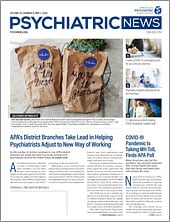Gabapentin is effective at reducing drinking among people with alcohol use disorder (AUD) and strong withdrawal symptoms, according to a study published in JAMA Internal Medicine.
Gabapentin has been used for years in hospitals to treat patients with acute alcohol withdrawal, which is characterized by symptoms such as sweating, tremors, anxiety, and irritability. Numerous clinical studies have tested this agent as a therapy for long-term alcohol reduction, but the results have been mixed; gabapentin is not FDA approved for AUD.
APA’s 2018 practice guideline on AUD pharmacotherapy suggests psychiatrists consider gabapentin for patients with moderate to severe alcohol use disorder who prefer gabapentin or are intolerant to or have not responded to the FDA-approved medications naltrexone and acamprosate.
Given gabapentin’s effectiveness for acute alcohol withdrawal problems, a research team at the Medical University of South Carolina (MUSC) explored whether AUD patients who exhibit more severe withdrawal symptoms might experience greater improvements with gabapentin than those who experience fewer symptoms. The researchers enrolled 96 adults who met the DSM-5 diagnosis for AUD, including alcohol withdrawal symptoms. Following three days of alcohol abstinence, the participants were randomly assigned to receive either gabapentin (starting at 300 mg/day and titrated up to 1,200 mg/day over five days) or placebo pills for 16 weeks.
Participants also received a brief medical management session (15 to 20 minutes) at weeks 1, 2, 3, 4, 6, 8, 10, 12, and 16. During these sessions, the participants’ progress in drinking reduction and lab results were reviewed. Participants’ reports on drinking were confirmed biochemically once a month by measuring the levels of a compound known as carbohydrate-deficient transferrin (%CDT) in the blood.
After 16 weeks, 27% of the overall participants taking gabapentin had no heavy drinking days (defined as consuming five or more drinks a day for men, four or more for women) compared with 9% of the participants taking placebo. In addition, 18% of the participants in the gabapentin group achieved total abstinence during the study, compared with 4% of the participants in the placebo group.
“What’s encouraging is that we achieved these positive outcomes without involving any intensive behavioral counseling,” said lead investigator Raymond Anton, M.D., a distinguished professor of psychiatry at MUSC and scientific director of the MUSC Alcohol Research Center. “That’s an important point when looking at clinical applications, since most treatment facilities don’t have the resources for intense outpatient behavioral treatment.”
While resources at treatment programs may be limited, it is important that patients taking medication for AUD receive regular follow-ups, Anton noted. “You need regular interactions to support your patient, encourage compliance, and test abstinence biochemically if at all possible,” he said.
To further assess how alcohol withdrawal symptoms affected response, Anton and colleagues divided the participants into high and low withdrawal groups—depending on whether they were above or below the average score of 8.5 on the Alcohol Withdrawal Symptom Checklist (AWSC) at the start of the study. At the end of the study, abstinence rates were higher and drinking levels were lower among those in the high withdrawal group taking gabapentin relative to placebo. Participants with fewer withdrawal symptoms had similar drinking levels regardless of whether they took gabapentin or placebo.
“It’s important for our field … to stop painting all treatment seekers with one broad brush,” Anton said. “This study takes a step in that direction by suggesting that gabapentin could be a specific treatment for patients who have a history of strong alcohol withdrawal symptoms.”
While an AWSC score of 8.5 was used as a cutoff in Anton’s study, he noted that clinical practice has not yet established a consensus definition for strong withdrawal symptoms. Patients who report and/or exhibit significant insomnia, tremors, sweating, gastrointestinal distress, or anxiety may be good candidates for gabapentin, he said.
In general, gabapentin was well tolerated among study participants, many of whom were taking other medications including antidepressants. “I would urge caution for any patients taking any other medications that work on the brain [outside of an antidepressant],” Anton said. Gabapentin use should be evaluated carefully when sedating drugs, including opiates and benzodiazepines, are also being ingested, he added. Modified gabapentin dosing, slower titration, and regular suicidal risk need careful consideration in such instances.
This study was supported by a grant from the National Institute on Alcohol Abuse and Alcoholism. ■
“Efficacy of Gabapentin for the Treatment of Alcohol Use Disorder in Patients With Alcohol Withdrawal Symptoms: A Randomized Clinical Trial” is posted
here.
APA’s Practice Guideline for the Pharmacological Treatment of Patients With Alcohol Use Disorder is posted
here.

